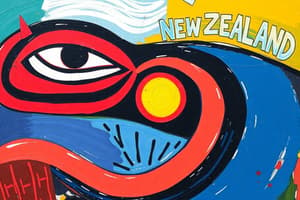Podcast
Questions and Answers
What does 'Whakapapa' refer to in Māori culture?
What does 'Whakapapa' refer to in Māori culture?
- A Māori greeting
- A type of traditional Māori house
- Genealogy or ancestry (correct)
- A traditional Māori dance
What is the correct pronunciation of the Māori phrase 'Tēnā koe'?
What is the correct pronunciation of the Māori phrase 'Tēnā koe'?
- TEH-nah KOH-eh (correct)
- TEN-ah KOH-eh
- TEN-ah KOH-ee
- TEH-nah KOH-ee
What is the Māori word for 'house'?
What is the Māori word for 'house'?
- Whānau
- Waka
- Whenua
- Whare (correct)
What is the grammatical word order in Māori sentences?
What is the grammatical word order in Māori sentences?
What is the significance of 'manaakitanga' in Māori culture?
What is the significance of 'manaakitanga' in Māori culture?
What is the celebration of Matariki?
What is the celebration of Matariki?
How are vowel pronunciations emphasized in Māori?
How are vowel pronunciations emphasized in Māori?
What is 'Tangata whenua'?
What is 'Tangata whenua'?
Study Notes
Basic Phrases
- Kia ora (KEY-o-ra): Hello
- Haere mai (HAY-reh MY): Welcome
- Whakapapa (FAH-kah-PAH-pah): Genealogy/ancestry
- Whānau (FAH-now): Family
- Ka kitea (KAH KEE-teh-ah): Goodbye
- Mauri ora (MAH-oo-ree OH-rah): Good health
- Tēnā koe (TEH-nah KOH-eh): Hello to one person
- Tēnā koutou (TEH-nah KOO-toh): Hello to a group
Vocabulary
- Whare (FAH-reh): House
- Whenua (WEH-noo-ah): Land
- Ngā (NAH-ngah): The (plural)
- Tamariki (TAH-mah-ree-kee): Children
- Pōtae (POH-tie): Hat
- Waka (WAH-kah): Canoe
- Hui (HOO-ee): Meeting
Grammar
- Verb-subject-object word order
- Use of possessive pronouns (e.g., taku, "my")
- Use of articles (e.g., te, ngā) to indicate singular or plural
- Use of passive and active voice
Pronunciation
- Emphasis on vowel pronunciation (e.g., "a" is pronounced like "car")
- Use of macrons (ā, ē, ī, ō, ū) to indicate vowel length
- Rolling "r" sound (e.g., "wh" is pronounced like "fur")
- Stress on the penultimate syllable in most words
Māori Culture
- Importance of whakapapa (genealogy) and whānau (family)
- Respect for tangata whenua (people of the land) and kaitiakitanga (guardianship)
- Significance of taonga (treasures) and tātai arorangi (star navigation)
- Value of manaakitanga (respect), whanaungatanga (kinship), and kōtuitanga (unity)
- Celebration of Matariki (Māori New Year) and other cultural events
Māori Language and Culture
Basic Phrases
- Kia ora: a greeting meaning "hello"
- Haere mai: a welcome phrase
- Whakapapa: refers to genealogy or ancestry
- Whānau: means "family"
- Ka kitea: a goodbye phrase
- Mauri ora: a phrase wishing good health
- Tēnā koe: a greeting to one person
- Tēnā koutou: a greeting to a group
Vocabulary
- Whare: means "house"
- Whenua: means "land"
- Ngā: a plural article meaning "the"
- Tamariki: means "children"
- Pōtae: means "hat"
- Waka: means "canoe"
- Hui: means "meeting"
Grammar
- Māori language follows a verb-subject-object word order
- Possessive pronouns are used, such as taku meaning "my"
- Articles te and ngā are used to indicate singular or plural nouns
- Both passive and active voice are used in the language
Pronunciation
- Emphasis is placed on vowel pronunciation, with "a" pronounced like "car"
- Macrons (ā, ē, ī, ō, ū) are used to indicate vowel length
- The "wh" sound is pronounced like a rolling "r" sound
- Stress typically falls on the penultimate syllable in most words
Māori Culture
- Whakapapa (genealogy) and whānau (family) are considered highly important
- Respect is given to tangata whenua (people of the land) and kaitiakitanga (guardianship)
- Taonga (treasures) and tātai arorangi (star navigation) hold significant cultural value
- The values of manaakitanga (respect), whanaungatanga (kinship), and kōtuitanga (unity) are highly valued
- Cultural events, including Matariki (Māori New Year), are celebrated
Studying That Suits You
Use AI to generate personalized quizzes and flashcards to suit your learning preferences.
Description
Learn basic phrases and vocabulary in Maori, including greetings, farewells, and common words.




